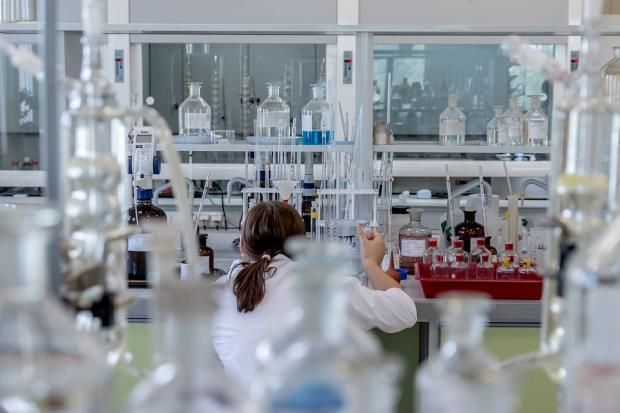Artificial intelligence can drastically reduce the time taken to develop new life-saving drugs. The healthcare industry is not immune to software and technological advancements. In fact, the use of emerging technologies like artificial intelligence (AI) has gradually begun to revolutionize research activities in the industry. Major advances in science and technology are also likely to improve diagnosis and treatment in the future.
copyright by finance.yahoo.com
 For example, last year, Glaxo GSK collaborated with two external companies —Exscientia, a UK specialist in machine-learning and Insilico Medicine, a U.S. leader in AI-led drug discovery —to harness the power of AI. Glaxo also has a partnership with AI driven drug design and development company, Cloud Pharmaceuticals. The partnership aims to use AI for the discovery of novel small-molecule drugs. Sanofi SNY also has a deal with Exscientia to find small molecule drugs for metabolic diseases such as diabetes.
For example, last year, Glaxo GSK collaborated with two external companies —Exscientia, a UK specialist in machine-learning and Insilico Medicine, a U.S. leader in AI-led drug discovery —to harness the power of AI. Glaxo also has a partnership with AI driven drug design and development company, Cloud Pharmaceuticals. The partnership aims to use AI for the discovery of novel small-molecule drugs. Sanofi SNY also has a deal with Exscientia to find small molecule drugs for metabolic diseases such as diabetes.
AI and the Drug Industry
The pharma/biotech industry has started adopting artificial intelligence, the simulation of human intelligence processes by machines, especially computer systems, albeit slowly. It is touted as the next big emerging technology in the biotech industry as it can drastically reduce time and costs involved in developing life-saving drugs.
A significant amount of time is invested in identifying a potential disease target and testing whether a candidate can hit that target. With the use of AI, it is estimated that the drug design timeframe can be cut down from four to five years to one year, thereby resulting in drastic reduction in costs. Drug/biotech companies can analyze huge amount of data by applying artificial intelligence and machine learning to identify patterns in ways that humans cannot. Artificial intelligence driven solutions can enable pharma/biotech companies to identify the appropriate patient population, reduce or eliminate the need for some studies, and in some cases even predict outcomes in a virtual patient.
Several collaborations have been formed in the past couple of years between big pharma/biotech players and small AI-driven companies, primarily startups to discover novel biological targets and molecules for pharma players using AI.
For example, last year, Glaxo GSK collaborated with two external companies —Exscientia, a UK specialist in machine-learning and Insilico Medicine, a U.S. leader in AI-led drug discovery —to harness the power of AI. Glaxo also has a partnership with AI driven drug design and development company, Cloud Pharmaceuticals. The partnership aims to use AI for the discovery of novel small-molecule drugs. Sanofi SNY also has a deal with Exscientia to find small molecule drugs for metabolic diseases such as diabetes.
Also, last year, Roche’s RHHBY pharma arm, Genentech formed a research partnership with GNS Healthcare to power cancer drug development with the latter’s REFS causal machine learning and simulation AI platform. Amgen and Celgene have also invested in GNS Healthcare. […]
Thank you for reading this post, don't forget to subscribe to our AI NAVIGATOR!
read more – copyright by finance.yahoo.com


Artificial intelligence can drastically reduce the time taken to develop new life-saving drugs. The healthcare industry is not immune to software and technological advancements. In fact, the use of emerging technologies like artificial intelligence (AI) has gradually begun to revolutionize research activities in the industry. Major advances in science and technology are also likely to improve diagnosis and treatment in the future.
copyright by finance.yahoo.com
AI and the Drug Industry
The pharma/biotech industry has started adopting artificial intelligence, the simulation of human intelligence processes by machines, especially computer systems, albeit slowly. It is touted as the next big emerging technology in the biotech industry as it can drastically reduce time and costs involved in developing life-saving drugs.
A significant amount of time is invested in identifying a potential disease target and testing whether a candidate can hit that target. With the use of AI, it is estimated that the drug design timeframe can be cut down from four to five years to one year, thereby resulting in drastic reduction in costs. Drug/biotech companies can analyze huge amount of data by applying artificial intelligence and machine learning to identify patterns in ways that humans cannot. Artificial intelligence driven solutions can enable pharma/biotech companies to identify the appropriate patient population, reduce or eliminate the need for some studies, and in some cases even predict outcomes in a virtual patient.
Several collaborations have been formed in the past couple of years between big pharma/biotech players and small AI-driven companies, primarily startups to discover novel biological targets and molecules for pharma players using AI.
For example, last year, Glaxo GSK collaborated with two external companies —Exscientia, a UK specialist in machine-learning and Insilico Medicine, a U.S. leader in AI-led drug discovery —to harness the power of AI. Glaxo also has a partnership with AI driven drug design and development company, Cloud Pharmaceuticals. The partnership aims to use AI for the discovery of novel small-molecule drugs. Sanofi SNY also has a deal with Exscientia to find small molecule drugs for metabolic diseases such as diabetes.
Also, last year, Roche’s RHHBY pharma arm, Genentech formed a research partnership with GNS Healthcare to power cancer drug development with the latter’s REFS causal machine learning and simulation AI platform. Amgen and Celgene have also invested in GNS Healthcare. […]
Thank you for reading this post, don't forget to subscribe to our AI NAVIGATOR!
read more – copyright by finance.yahoo.com
Share this: